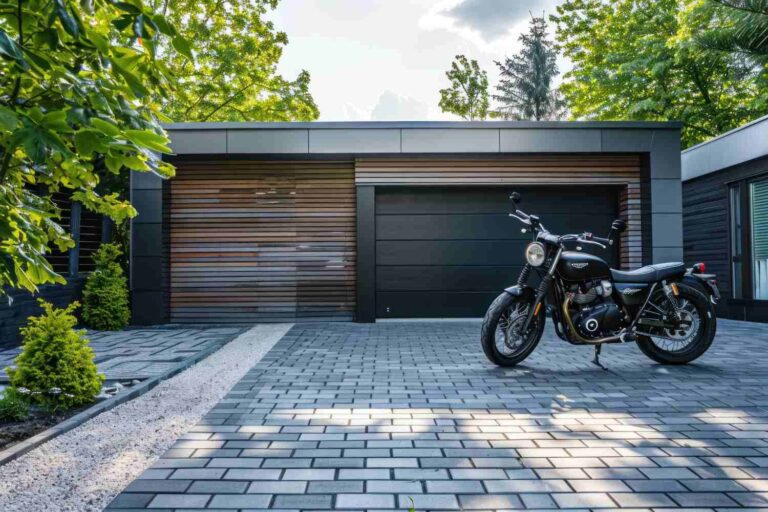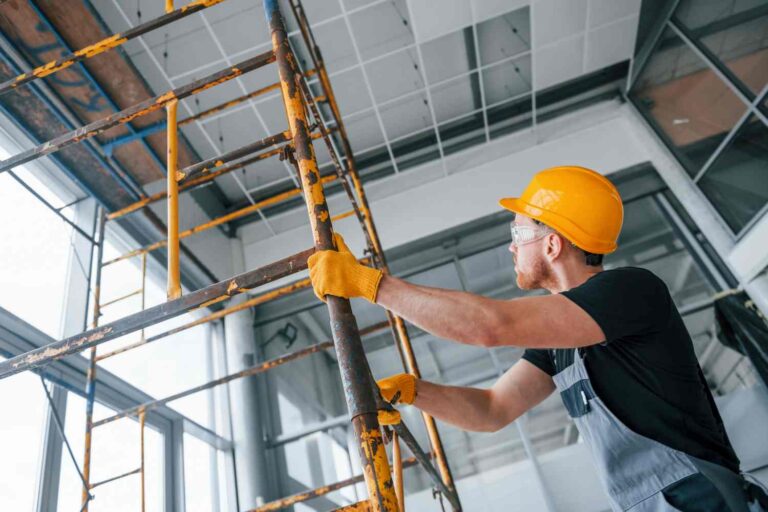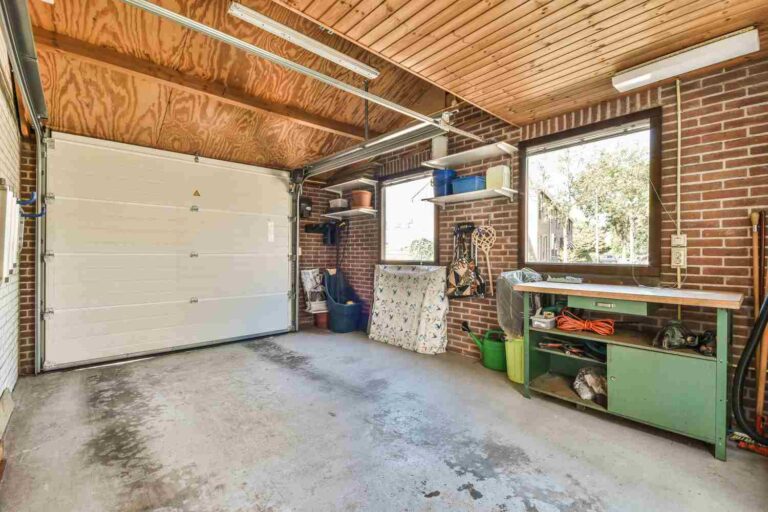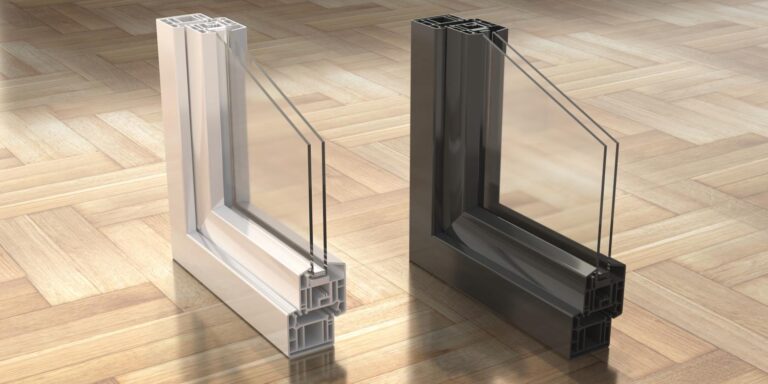- 17 September 2024
- 4 min read
How to create the perfect driveway?

Table of contents
Why is a well-designed driveway so important?
A well-designed driveway is crucial for several reasons, impacting both functionality and curb appeal. Firstly, it serves as the primary access route to your home, needing to withstand regular vehicle traffic without deteriorating prematurely. A properly constructed driveway prevents issues like potholes and cracks, which are not only unsightly but can also damage vehicles and pose safety hazards.
Planning your perfect driveway
Here’s a structured approach to help you get started:
- Assess your needs – determine the size and capacity of your driveway based on the number of vehicles you own and the available space. Consider future needs as well, such as additional vehicles or heavy traffic.
- Choose the right material – select materials that fit your climate, budget, and the style of your home. Common options include concrete, asphalt, gravel, and pavers. Each has its advantages and disadvantages in terms of cost, durability, maintenance, and appearance.
- Design for functionality – plan the layout of your driveway with ease of access and mobility in mind. Ensure there is enough turning space and consider the slope of the driveway for proper drainage. Avoid steep inclines if possible, to enhance accessibility and safety.
- Incorporate drainage solutions – proper drainage is crucial to prevent water accumulation that can damage the driveway and adjacent structures. Plan for grading, drainage ditches, or installing permeable materials to manage water runoff effectively.
- Consider aesthetics – enhance curb appeal by aligning the driveway’s design with your home’s exterior. Consider adding design elements such as borders, patterns, or colors. Landscaping around the driveway can also improve its appearance and integrate it with your overall property design.
- Secure necessary permits – before construction begins, check local regulations, and secure any necessary permits. Some locales might have specific requirements about the materials and methods used for driveway construction.
- Hire professionals – depending on the complexity and material choice, consider hiring professionals for construction. Experienced contractors can provide valuable insights, ensure quality work, and handle any unexpected issues during the installation.
Aesthetic qualities of the driveway
The aesthetics of a driveway enhance a property’s curb appeal. Choices in materials, colors, and layout can complement a home’s exterior, while decorative borders and patterns add unique visual interest.
Choosing the right driveway materials
Choosing the right driveway surfaces materials involves considering factors like durability, maintenance, driveway cost, and aesthetics. Here’s a list of common materials used for driveways:
- Concrete – highly durable and offers a clean, consistent look. It can be stamped or colored for a decorative effect.
- Asphalt – ideal for colder climates due to its flexibility under temperature fluctuations. It requires periodic sealing but provides a smooth, durable surface.
- Gravel – affordable and quick to install, offering good drainage. However, it can shift and may require periodic replenishment.
- Pavers – available in various materials such as concrete, clay, and natural stone. They are highly aesthetic and can be laid in various patterns but are typically more expensive than other options.
- Brick – offers a classic look that can enhance the charm of a home. It’s durable but can be expensive and require more maintenance to maintain its appearance.
- Crushed stone – like gravel but finer and more stable. It provides good drainage and has a more polished look than plain gravel.
- Recycled materials – options like recycled concrete or rubber provide an environmentally friendly choice and can offer unique aesthetics and benefits depending on the material.
Incorporating drainage solutions
Incorporating effective drainage in your driveway design is crucial. Use a slight slope to direct water runoff, install channels or grates for better water management, and consider permeable paving materials to allow water to seep through.
Safe and functional driveway
A safe and functional driveway features a gentle slope for easy navigation, ample lighting for visibility, and a smooth surface free from obstructions. Proper width and turning areas ensure ease of use.
The perfect driveway – commission a specialist or do it yourself?
For the perfect driveway, hiring a professional is highly recommended. Specialists bring expertise in design and construction, ensuring the driveway is built to last, meets all safety standards, and aligns aesthetically with your home. They can handle technical challenges like grading and drainage effectively, and their experience with materials can guide you to the best choices for your climate and usage needs. While DIY can be tempting for cost savings, the long-term benefits of professional installation—durability, functionality, and enhanced curb appeal—make it a worthwhile investment.
You might be interested in...
- Building advice

17 September 2024
Fundamentals of scaffolding
Scaffolding is a crucial temporary structure in construction, used to support workers and materials at elevated heights. There are several types of scaffolding: supported scaffolding, suspended scaffolding, and mobile scaffolding. Regulations mandate that scaffolds support their weight plus four times the maximum intended load. Workers need specific training on the scaffolding they use, including safe operation, hazard recognition, and understanding of load capacities.
- Building advice

17 September 2024
What is the cost of converting a garage?
Cost of converting a garage into a room, for example, in the UK can vary basing on several factors. Typically, a basic garage conversion costs between £7,500 and £15,000. More extensive projects, including plumbing, electrical work, and high-end finishes, can range from £15,000 to £30,000 or more. Key factors influencing the cost include the size and layout of the garage, the quality of materials used, the need for insulation and heating, and compliance with local building regulations. Obtaining detailed quotes from local contractors is essential for an accurate estimate.
- Building advice

17 September 2024
Benefits and drawbacks of double glazed windows
Double glazed windows are a popular choice for homeowners looking to enhance their property’s energy efficiency and comfort. Comprising two layers of glass with a space between them, these windows are designed to reduce heat transfer, making them an ideal investment for both warm and cool climates. While they offer significant advantages such as improved insulation and noise reduction, double glazed windows also come with certain drawbacks, including higher initial costs and potential issues with seal integrity. In this article, we’ll explore both the benefits and disadvantages of double glazed windows to help you determine if they are the right choice for your home.